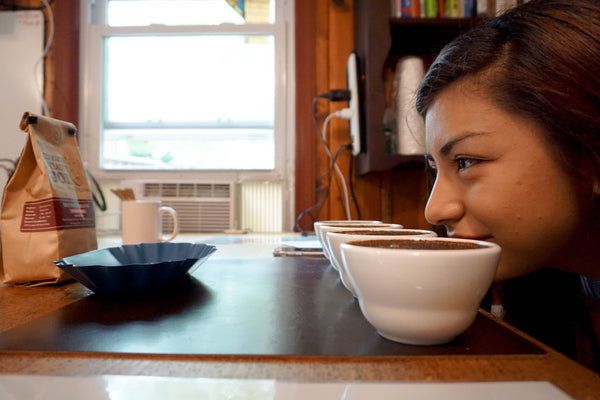Everybody knows things are better fresh. But why is coffee fresh off the roast any better than coffee that’s been sitting on the shelf for a few months at the gourmet grocery? Why is it all that important to look at the “Roast Date” on bags of coffee you buy at retail stores? What––scientifically––does “freshness” even mean in the coffee context?
To answer these questions, we need to dive deep into the chemistry of what happens to coffee beans as a result of roasting them at high temperatures. As soon as you scorch raw coffee beans into the delicious brown roasts we know and love, the natural flavors, aromas, and soul of the coffee starts to degrade. Essentially, the chemical structure of the beans changes, and after a time, they begin to lose desirable flavors and aromas, and accumulate undesirable flavors.
One big part of the deterioration process revolves around the build-up and release of carbon dioxide (which can create the beautiful “bloom” during brewing) and the exchange of certain sulfurous compounds (which contribute the exquisite natural flavors and aromas of certain Arabica coffees). Some of the most important compounds, such as sweet-smelling “aldehydes” and earthy “pyrazines,” evaporate very quickly upon contact with air––even before packaging, and even under low-oxygen conditions or inside vacuum-sealed bags. The chemical structures within a raw coffee bean usually prevent this from happening, but subjecting the bean to high roasting temperatures sets a fuse on freshness.
It’s worth noting that physically breaking down the beans by grinding them, or adding a solvent like water, shortens that fuse even further. This explains why we always recommend freshly-roasted, freshly-ground, and freshly-brewed coffee as the ways to ward off the three corresponding enemies of coffee––heat, oxygen, and moisture.
Back to our gases and compounds. As desirable flavors and aromas leave the coffee bean, their oxidation causes other unwelcome compounds to amass, contributing to staleness. Humidity and exposure to oxygen can speed things up even further––something especially important for DC-area residents given the city’s swampy summers.
That said, even if it’s important to enjoy coffee soon after roasting, we don’t recommend brewing it the moment that it comes from the roaster. There is a peak “resting time” following each varietal’s roasting before the coffee’s body and signature flavors tend to surface. The initial stress of roasting traps large amounts of carbon dioxide in the beans, which overwhelm the palate with unremarkable “toasted” flavors that drown out the nuances of the bean. In other words, you don’t want coffee beans to deteriorate too much…but if you don’t let the deterioration process begin after roasting, you might just be tasting the burnt flavors from the roast itself.
At Commonwealth Joe, we bridge that gap by delivering coffee within 48 hours of roasting. This way, our coffee has been allowed to rest after roasting, but can also be enjoyed before any of the deterioration processes make too much head way. We’ve found it’s the best way to guarantee the richest flavors and aromas in every brew.


